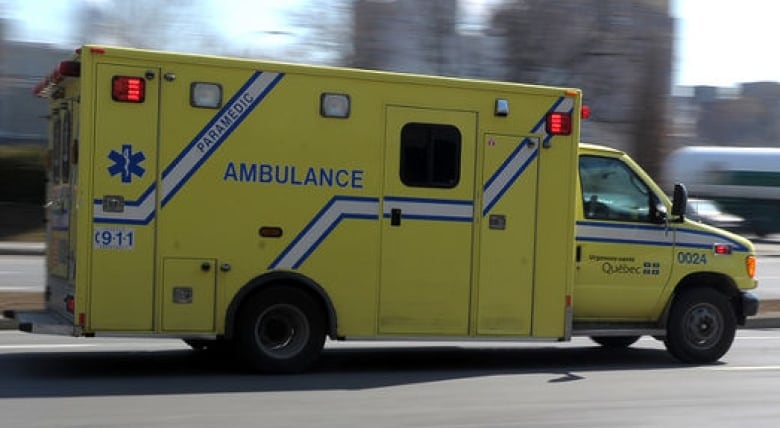Enhanced Rural Healthcare: Manitoba Deploys Advanced Care Paramedics

Table of Contents
Expanding Access to Specialized Care in Rural Manitoba
Rural healthcare access in Manitoba has been historically challenged by distance and limited resources. The introduction of ACPs is dramatically changing this landscape. These paramedics provide advanced life support (ALS) and critical care interventions previously unavailable in many rural areas, significantly improving patient outcomes.
- Advanced Life Support (ALS) on-site: ACPs deliver ALS, including advanced airway management (intubation, advanced airway adjuncts), medication administration (e.g., advanced cardiac life support medications), cardiac monitoring, and other critical interventions, directly to patients in the field. This eliminates the crucial time lost during transport to larger hospitals.
- Reduced Transport Times: By providing care at the scene, ACPs reduce the time it takes to get patients to definitive care, a critical factor in situations involving trauma, stroke, or cardiac arrest. This reduction in transport time directly translates to improved survival rates and better neurological outcomes.
- Improved Patient Outcomes: Data from Manitoba’s ACP program is demonstrating a significant positive impact on patient outcomes. Studies are showing reduced mortality rates and improved functional recovery for patients receiving prehospital ALS.
- Examples of ACP Procedures: ACPs in Manitoba are trained and equipped to perform a wide range of advanced procedures, including 12-lead ECG interpretation, advanced cardiac life support (ACLS), management of severe bleeding, and the administration of a variety of medications, drastically increasing the level of care available in rural areas.
- Statistics: While specific, publicly available statistics are still being compiled and analyzed, early indicators from the Manitoba program strongly suggest improved response times and a marked reduction in mortality rates among patients receiving ACP care compared to those treated solely by basic life support paramedics.
The Role of Technology in Enhancing ACP Effectiveness
Technology plays a crucial role in maximizing the effectiveness of Manitoba's ACP program. It bridges the geographical gap, facilitates communication, and enhances the quality of care provided in remote settings.
- Telemedicine Integration: ACPs utilize telemedicine to consult with specialists in real-time, providing remote consultations during critical situations. This access to expert advice greatly enhances the decision-making process and ensures the best possible care is administered, even in isolated locations.
- Mobile Technology: Mobile technology is central to ACP operations. Secure communication networks allow for seamless data sharing with hospitals, specialists, and other EMS personnel, streamlining the transfer of crucial patient information and facilitating smooth handovers of care.
- Remote Patient Monitoring: ACPs utilize mobile technology to remotely monitor vital signs, ensuring that patients are closely observed even after initial treatment and during transportation. This capability allows for early detection of deterioration and timely interventions.
- Data Collection and Analysis: The data collected through mobile technology and other methods allows for ongoing analysis and improvement of the ACP program. This iterative process ensures that resources are optimized, and patient care is continually enhanced.
- Specific Technologies: Manitoba's ACP program leverages various technologies, including secure video conferencing, ruggedized tablets with advanced medical applications, and sophisticated telecommunications infrastructure to support reliable communication even in areas with limited cell service.
Addressing the Challenges of Rural Healthcare Delivery
The successful deployment of ACPs in Manitoba has required overcoming significant challenges inherent in delivering healthcare to rural communities.
- Alleviating Hospital Burden: By providing advanced care at the scene, ACPs reduce the burden on overburdened rural hospitals, freeing up valuable resources and ensuring that emergency departments can focus on patients who require immediate admission.
- Recruitment and Retention: Attracting and retaining highly skilled ACPs in rural communities requires targeted recruitment strategies, competitive compensation packages, and supportive community environments. Manitoba is actively addressing this challenge through various incentives and support programs.
- Infrastructural Challenges: Providing effective ACP services in rural areas requires investment in robust telecommunications infrastructure, reliable transportation systems, and well-equipped paramedic bases. Manitoba is continually upgrading its infrastructure to support these needs.
- Unique Needs of Remote Communities: The specific needs of isolated and remote communities are carefully considered, with tailored training programs and resource allocation ensuring equitable access to advanced care. This may include specialized training in wilderness medicine or other relevant areas.
- Cost-Effectiveness: The Manitoba ACP program has demonstrated cost-effectiveness compared to alternative models of care. Studies show that the benefits of improved patient outcomes and reduced hospitalizations outweigh the costs of implementing and maintaining the program.
Training and Certification of Advanced Care Paramedics
The rigorous training and certification of ACPs are paramount to the success of the program.
- Rigorous Training Program: Manitoba's ACP training program is highly rigorous, combining extensive classroom instruction with substantial hands-on practical training to equip paramedics with the advanced skills needed.
- Continuing Education: Continuing education and professional development are emphasized to ensure ACPs maintain their proficiency and stay abreast of the latest advancements in paramedicine.
- Specific Skills and Certifications: ACPs in Manitoba receive advanced certifications in areas such as ACLS, PALS (Pediatric Advanced Life Support), and other relevant specialties ensuring they are equipped to handle various medical emergencies.
- Collaboration: The training program is developed in collaboration with leading educational institutions and healthcare organizations to ensure the highest standards of training are met.
Conclusion
The deployment of advanced care paramedics in Manitoba represents a significant advancement in rural healthcare. By providing timely access to specialized care, leveraging technology, and addressing critical workforce challenges, this initiative is improving patient outcomes and healthcare equity across the province. This commitment to enhanced rural healthcare access underscores Manitoba's dedication to ensuring all citizens receive the highest quality medical care, regardless of their location.
Call to Action: Learn more about the impact of enhanced rural healthcare initiatives in Manitoba and how advanced care paramedics are transforming rural medical response. Discover how Manitoba’s commitment to advanced care paramedics is shaping the future of rural healthcare.

Featured Posts
-
 Hhs Reverses Course On Transgender Care Providers React To New Protocols
May 30, 2025
Hhs Reverses Course On Transgender Care Providers React To New Protocols
May 30, 2025 -
 Bts El Tiempo De Espera Tras El Servicio Militar
May 30, 2025
Bts El Tiempo De Espera Tras El Servicio Militar
May 30, 2025 -
 From Marvel To Sinner Should You Watch The Post Credits Scenes
May 30, 2025
From Marvel To Sinner Should You Watch The Post Credits Scenes
May 30, 2025 -
 Limited Gorillaz Tickets Available Copper Box Arena London
May 30, 2025
Limited Gorillaz Tickets Available Copper Box Arena London
May 30, 2025 -
 Six Victims One Death Bath Investigating A Serial Killers Atrocity
May 30, 2025
Six Victims One Death Bath Investigating A Serial Killers Atrocity
May 30, 2025
